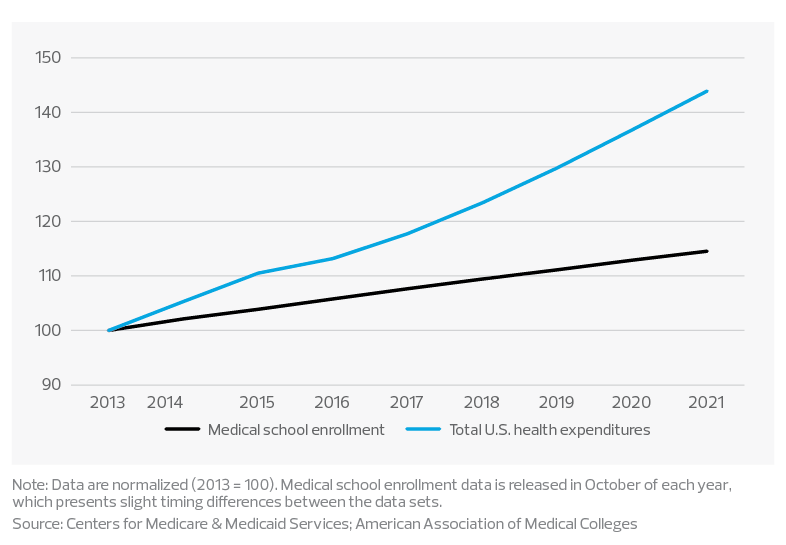Insights and Resources
ChatGPT could help overburdened physicians, but careful evaluation is needed
PERSPECTIVE | April 04, 2023
Authored by RSM US LLP
Health care's post-pandemic lurch into the virtual world has challenged physicians to continuously communicate with their patients as they provide care. But as the patient-doctor relationship has evolved, physicians have found themselves responding to sometimes thousands of patient messages every week through emails and patient portals.
Middle market insight
ChatGPT does not formulate the response directly to patients. Providers are still in control of how care and messaging to the patients are communicated.
Health care advocates, leaders and scholars have long evangelized the need for more constant touch points with patients. But that continuous communication and access to care have led to an unintended burden on physicians. At a time when the number of physicians has dwindled, that burden has become heavier for those doctors.
According to current data, medical school enrollment is down, yet health care demand continues to increase. This signals the need for even more efficiencies in health care, but not at the expense of optimal patient engagement.
Health care demand has grown 3x medical school enrollment since 2013

Can technology help the overburdened health care sector?
Emerging technologies such as ChatGPT offer potential solutions to the challenges of patient engagement and communication for overburdened physicians and staffs.
For instance, in terms of the sheer volume of patient messages, more and more physicians may find they may not have time to decipher them. And while some health systems have announced they may begin charging for patient messages, perhaps curbing message volume slightly, responding to messages still requires attention from the provider—time and resources that many providers would argue they do not have.
Responding to messages, while generally perceived as good care, can lead to providers working even longer hours, which leads to burnout in a profession that cannot afford to lose more physicians and staff.
ChatGPT could provide potential solutions to these challenges. A recent use case involved summarizing patient messages to allow physicians to respond more accurately and efficiently. Patients are generally not experts at clearly describing their physical or mental symptoms, and often those explanations can affect the coherence of a message.
In this scenario, a physician asked ChatGPT to summarize patient messages and received, in return, a succinct, thoughtful post condensing critical details, allowing for faster assessment and the ability to reply quickly to the patient. This was repeated in other patient messages, allowing the physician to handle the large volume of communications effectively.
It’s important to note that ChatGPT does not formulate the response directly to patients. Providers are still in control of how care and messaging to the patients are communicated. Providers can leverage this technology to respond to patients more quickly and efficiently.
In the meantime, while regulations develop and the sophistication of ChatGPT solutions improves, additional ChatGPT applications could include streamlined patient monitoring and reminders on screenings and prescription refills; clinical notes and discharge summaries; assessments of patient histories; customized health plans; and lab and imaging results extraction for physician review and decision-making.
The takeaway
Artificial intelligence and other digital technologies like ChatGPT are not a panacea for all the ills facing hospitals and health care systems. Each use case requires careful evaluation by both clinical and administrative leaders.
However, for applicable use cases, technology like ChatGPT could exponentially improve health care organizations’ ability to address physician burdens, expand access to care, improve outcomes and patient experience, and reduce costs.
Let's Talk!
Call us at +1 213.873.1700, email us at solutions@vasquezcpa.com or fill out the form below and we'll contact you to discuss your specific situation.
This article was written by Michael Haas, Richard Kes , Matt Wolf and originally appeared on Apr 04, 2023.
2022 RSM US LLP. All rights reserved.
https://rsmus.com/insights/industries/health-care/chatgpt-help-overburdened-physicians-careful-evaluation-needed.html
RSM US Alliance provides its members with access to resources of RSM US LLP. RSM US Alliance member firms are separate and independent businesses and legal entities that are responsible for their own acts and omissions, and each is separate and independent from RSM US LLP. RSM US LLP is the U.S. member firm of RSM International, a global network of independent audit, tax, and consulting firms. Members of RSM US Alliance have access to RSM International resources through RSM US LLP but are not member firms of RSM International. Visit rsmus.com/about us for more information regarding RSM US LLP and RSM International. The RSM logo is used under license by RSM US LLP. RSM US Alliance products and services are proprietary to RSM US LLP.

Vasquez & Company LLP is a proud member of the RSM US Alliance, a premier affiliation of independent accounting and consulting firms in the United States. RSM US Alliance provides our firm with access to resources of RSM US LLP, the leading provider of audit, tax and consulting services focused on the middle market. RSM US LLP is a licensed CPA firm and the U.S. member of RSM International, a global network of independent audit, tax and consulting firms with more than 43,000 people in over 120 countries.
Our membership in RSM US Alliance has elevated our capabilities in the marketplace, helping to differentiate our firm from the competition while allowing us to maintain our independence and entrepreneurial culture. We have access to a valuable peer network of like-sized firms as well as a broad range of tools, expertise and technical resources.
For more information on how Vasquez & Company LLP can assist you, please call +1 213.873.1700.